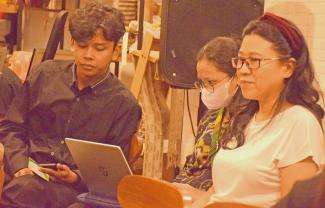From production to processing, Indigenous women play a significant role in providing food for their families on a daily basis. However, when climate change impacts affect marine resources and disrupt agriculture, they are particularly susceptible.
From 9-11 March 2023, a consortium event was held in Jakarta, Indonesia, to celebrate International Women’s Day (IWD). The event, which was a collaborative effort between members of PARARA (Panen Raya Nusantara, or Archipelago Harvest), drew together women fishers and farmers from all over Indonesia to tell their story.
The PARARA Consortium, which includes Samdhana Institute, aims to support local communities and indigenous peoples’ initiative for sustainable development and preserving cultural heritage. By showcasing their products, PARARA not only promotes economic empowerment but also raises awareness about the importance of preserving traditional knowledge and protecting the environment.
Advocating for women fishers in Sumatra and Java
In Lampung, on the Indonesian island of Sumatra, fisherwomen are increasingly concerned about their livelihoods. Yields from the shrimp ponds they rely on to provide for their families have been dwindling in recent years.
"We experience sudden heatwaves and excessive rainfall," explains Ezra, a fisherwoman from Lampung, speaking at the dialog session of the event. “We haven’t even harvested in two years,” she added. Previously, she could harvest three or four cycles in one year, but now such results are rare.
Ezra and other women in her community have joined forces and are exploring alternative ways to diversify their livelihoods. As she explains, “we process food from shrimp skin and local plants around where we live, providing an alternative source of income for our families. We distribute these products through group cooperatives (BUMDES).”
Initiatives known as UMKM (Usaha Mikro, Kecil, dan Menengah/ Micro, Small, and Medium Enterprises) are an increasingly common feature of Indonesia’s rural economies, as more and more women look for alternatives to traditional farming and fishing practices. Masnuah is a fisherwoman from Demak in Central Java, who also joined the PARARA IWD event. In response to the growing pressures brought about by climate change in her community, she and other women decided to open a café.
"In Demak, there are 21 fisherwomen who have joined together to make a business by making food products from plants to sell at MSME cafes," said Masnuah. At present, these women lack support and protection from the government. Invariably, government assistance such as subsidies and health insurance have been directed towards men.
After years of hard work and advocacy, these women have successfully obtained profession status as fishermen on their identification cards (KTP). This is a significant milestone for gender equality and empowerment in the fishing industry. The official recognition they have received as fishers on their KTPs is a major step forward in ensuring equal opportunities and rights for women in this profession.
"After two years of struggle, we have finally obtained insurance as fisherwomen," shared Masnuah.

Supporting women farmers in Kalimantan
Climate change is having an equally disastrous impact on the many women farmers working in Indonesia. Noberta Yati Lantok is from West Kalimantan. She says climate change is causing dramatic shifts in crop cycles, which affect the quantity and quality of food she can produce.
A similar situation is unfolding in South Kalimantan, where farmers such as Enik Maslahah have had to import rice from neighbouring provinces in order to compensate for the sudden shortfall in production. Many women have also begun to cultivating lotus flower in peatland, which, when processed into talipuk flour, can offer a substitute for rice.
"We process this flour into cookies," explains Enik. The practice of processing lotus seeds for daily consumption dates back to ancient times and is a healthier and more affordable alternative to other staples, like rice. "By making it (the flour) into cookies, young people have also become more interested in their environment and have realised the potential wealth available,” said Enik.
Planting lotus seeds has provided a source of income for local people, reconnected communities with their heritage and even helped to promote eco-tourism in the area. In addition to these socio-economic benefits, this process has also proven to be a more environmentally friendly option; planting lotus flowers in peatland areas has actively helped to preserve the natural ecosystem.
Restiawati, a blind barista and founder of Kopi Netra, is another woman who is playing a central role in the promotion of local products. She receives support from Samdhana, and we have been helping Resti get involved in events as we strive to create an inclusive space that upholds human rights values for all. Resti uses local coffee beans in her shop and continues to inspire and motivate other women to seize opportunities and change their situations.
PARARA International Women’s Day event in Jakarta provided a key rallying point for the women farmers and fishers of Indonesia. The gathering provided tangible examples of the troubles they face, along with uplifting success stories from Indigenous-led businesses and women’s cooperatives working together across the archipelago.
Moving forward, Samdhana will continue to support these women through a combination of capacity building, supportive policies and the promotion of collaborative networks connecting women, government and CSOs. By working together, we can overcome the challenges posed by climate change and grow a greener, more inclusive future.




